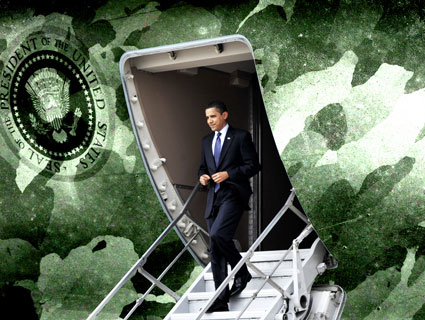
<a href="http://www.flickr.com/photos/truthout/4790538809">Truthout.org</a>/Flickr
This story first appeared on the TomDispatch website.
When I was young, the Philadelphia Bulletin ran cartoon ads that usually featured a man in trouble—dangling by his fingers, say, from an outdoor clock. There would always be people all around him, but far too engrossed in the daily paper to notice. The tagline was: “In Philadelphia, nearly everybody reads the Bulletin.”
![]() Those ads came to mind recently when President Obama commented forcefully on war, American-style, in ways that were remarkably radical. Although he was trying to ward off a threatened Israeli preemptive air strike against Iran, his comments should have shocked Americans—but just about nobody noticed.
Those ads came to mind recently when President Obama commented forcefully on war, American-style, in ways that were remarkably radical. Although he was trying to ward off a threatened Israeli preemptive air strike against Iran, his comments should have shocked Americans—but just about nobody noticed.
I don’t mean, of course, that nobody noticed the president’s statements. Quite the contrary: they were headlined, chewed over in the press and by pundits. Mitt Romney, Rick Santorum, and Newt Gingrich attacked them. Fox News highlighted their restraint. (“Obama calls for containing Iran, says ‘too much loose talk of war.'”) The Huffington Post highlighted the support for Israel they represented. (“Obama Defends Policies Toward Israel, Fends Off Partisan Critiques.”) Israeli Prime Minister Netanyahu pushed back against them in a potentially deadly US-Israeli dance that might bring new chaos to the Middle East. But somehow, amid all the headlines, commentary, and analysis, few seemed to notice just what had really changed in our world.
The president had offered a new definition of “aggression” against this country and a new war doctrine to go with it. He would, he insisted, take the US to war not to stop another nation from attacking us or even threatening to do so, but simply to stop it from building a nuclear weapon—and he would act even if that country were incapable of targeting the United States. That should have been news.
Consider the most startling of his statements: just before the arrival of Israeli Prime Minister Benjamin Netanyahu in Washington, the president gave a 45-minute Oval Office interview to the Atlantic’s Jeffrey Goldberg. A prominent pro-Israeli writer, Goldberg had produced an article in the September issue of that magazine headlined “The Point of No Return.” In it, based on interviews with “roughly 40 current and past Israeli decision makers about a military strike,” he had given an Israeli air attack on Iran a 50 percent chance of happening by this July. From the recent interview, here are Obama’s key lines:
“I think that the Israeli government recognizes that, as president of the United States, I don’t bluff. I also don’t, as a matter of sound policy, go around advertising exactly what our intentions are. But I think both the Iranian and the Israeli governments recognize that when the United States says it is unacceptable for Iran to have a nuclear weapon, we mean what we say.”
Later, he added this chilling note: “I think it’s fair to say that the last three years, I’ve shown myself pretty clearly willing, when I believe it is in the core national interest of the United States, to direct military actions, even when they entail enormous risks.”
The next day, in a speech meant to stop “loose talk about war” in front of a powerful pro-Israeli lobbying outfit, the American Israel Public Affairs Committee (AIPAC), the president offered an even stronger formula, worth quoting at length. Speaking of seeing the consequences of his decisions to use force “in the eyes of those I meet who’ve come back gravely wounded,” he said:
“And for this reason, as part of my solemn obligation to the American people, I will only use force when the time and circumstances demand it… We all prefer to resolve this issue diplomatically. Having said that, Iran’s leaders should have no doubt about the resolve of the United States—just as they should not doubt Israel’s sovereign right to make its own decisions about what is required to meet its security needs. I have said that when it comes to preventing Iran from obtaining a nuclear weapon, I will take no options off the table, and I mean what I say. That includes all elements of American power… and, yes, a military effort to be prepared for any contingency.
“Iran’s leaders should understand that I do not have a policy of containment; I have a policy to prevent Iran from obtaining a nuclear weapon. And as I have made clear time and again during the course of my presidency, I will not hesitate to use force when it is necessary to defend the United States and its interests.”
An American president couldn’t come closer to saying that, should American intelligence conclude the Iranians were building a nuclear weapon, we would attack. The next day, again addressing an AIPAC audience, Secretary of Defense Leon Panetta set the president’s commitment in stone: “No greater threat exists to Israel, to the entire region, and indeed to the United States, than a nuclear-armed Iran… Military action is the last alternative if all else fails, but make no mistake: When all else fails, we will act.”
The Power of Precedents
To understand what’s truly new here, it’s necessary to back up a few years. After all, precedent is a powerful thing and these statements do have a single precedent in the atomic age (though not one the president would profess to admire): the Bush administration’s 2003 invasion of Iraq. After all, one clearly stated reason for the invasion was Saddam Hussein’s supposed nuclear program as well as one to produce biological and chemical weapons of mass destruction (WMD).
In a series of speeches starting in August 2002, President George W. Bush publicly accused the Iraqi dictator of having an active nuclear program. His vice president hit the news and public affairs talk show circuit with a set of similar accusations, and his secretary of state spoke of the danger of mushroom clouds rising over American cities. (“We do know that [Saddam] is actively pursuing a nuclear weapon… [W]e don’t want the smoking gun to be a mushroom cloud.”)
At the same time, the Bush administration made an effort—now long forgotten—to convince Congress that the United States was in actual danger of an Iraqi WMD attack, possibly from anthrax, in the immediate future. President Bush suggested publicly that, with unmanned aerial vehicles (drones), Saddam might have the ability to spray East Coast cities with chemical or biological weapons. And Congress was given fear-inducing classified private briefings on this.
Democratic Senator Bill Nelson of Florida, for example, claimed that he voted for the administration’s resolution authorizing force in Iraq because “I was told not only that [Saddam had weapons of mass destruction] and that he had the means to deliver them through unmanned aerial vehicles, but that he had the capability of transporting those UAVs outside of Iraq and threatening the homeland here in America, specifically by putting them on ships off the eastern seaboard.”
 Driving the need to produce evidence, however fantastic or fabricated, of a possible threat to the US was a radical new twist on war-making 101. In the days after 9/11, Vice President Dick Cheney proposed that even a 1 percent chance of an attack on the United States, especially involving weapons of mass destruction, must be dealt with as if it were a certainty. Journalist Ron Suskind dubbed it “the one percent doctrine.” It may have been the rashest formula for “preventive” or “aggressive” war offered in the modern era.
Driving the need to produce evidence, however fantastic or fabricated, of a possible threat to the US was a radical new twist on war-making 101. In the days after 9/11, Vice President Dick Cheney proposed that even a 1 percent chance of an attack on the United States, especially involving weapons of mass destruction, must be dealt with as if it were a certainty. Journalist Ron Suskind dubbed it “the one percent doctrine.” It may have been the rashest formula for “preventive” or “aggressive” war offered in the modern era.
Of course, the fact that Saddam’s Iraq had no nuclear program, no biological or chemical weapons, no functioning drones, and no way of reaching the East Coast of the United States proved strike three for critics of the Bush administration. Missed was what was truly new in the invasion: not just the 1 percent doctrine itself, but the idea—a first on planet Earth—of going to war over the possibility that another country might be in possession of nuclear or other weapons of mass destruction.
Until then, such a concept hadn’t been in the strategic vocabulary. Quite the opposite: in the Cold War years, nuclear weapons were thought of as “deterrence” or, in the case of the two massively nuclear-armed superpowers of that era, “mutually assured destruction” (with its fabulously grim acronym MAD). Those weapons, that is, were considered guarantors, however counterintuitively, against an outbreak of war. Their possession was a kind of grisly assurance that your opponent wouldn’t attack you, lest you both be destroyed.
In that spirit, between the dropping of atomic bombs on the Japanese cities of Hiroshima and Nagasaki in August 1945 and the Iraqi invasion of March 2003, seven countries—the Soviet Union, England, France, China, Israel (though its large nuclear arsenal remains unacknowledged), India, and Pakistan—all went nuclear without anybody suggesting that they be attacked simply for possessing such weapons. An eighth country—white-ruled South Africa—actually assembled six nuclear weapons, and later became the only country to de-nuclearize itself. South Korea, Taiwan, Argentina, and Brazil all had incipient nuclear programs, though none produced weapons. Japan is today considered to be at a point the Iranians have not yet reached: “breakout capacity,” or the ability to build a nuclear weapon relatively quickly if a decision to do so were made. In 2006, North Korea set off its first nuclear test and, within years, had become the ninth active nuclear power.
In other words, in 2003, the idea that the possession of nuclear weapons or simply of an “active” nuclear program that might one day produce such weapons was a casus belli represented something new. And when it became clear that Saddam had no nuclear program, no weapons of mass destruction at all, that explanation for American war-making, for what Jonathan Schell once dubbed “disarmament wars”—so visibly fraudulent—seemed to disappear into the dustbin of history.
War and the Presidential “I”
Until now, that is.
Whether he meant to or not, in his latest version of Iran war policy President Obama has built on the Bush precedent. His represents, however, an even more extreme version, which should perhaps be labeled the 0 percent Doctrine. In holding off an Israeli strike that may itself be nothing but a bluff, he has defined a future Iranian decision to build a nuclear weapon as a new form of aggression against the United States. We would, as the president explained to Jeffrey Goldberg, be committing our military power against Iran not to prevent an attack on the US itself, but a nuclear arms race in the Middle East.
And by the way, note that he didn’t say, “We don’t bluff.” His formulation was: “I don’t bluff.” And that “I” should not be ignored. The Bush administration promoted a cult of presidential power, of (as they called it at the time) a “unitary executive.” No one in the White House uses such a term these days, any more than they use the term “Global War on Terror,” but if both terms have disappeared, the phenomena they named have only intensified.
The Global War on Terror, with its burgeoning secret military, the elite special operations forces, and its growing drone air force, controlled in part by the CIA, should be thought of as the president’s private war. In addition, as legal scholar Jonathan Turley wrote recently, when it comes to drone assassinations (or “targeted killings” as they are now more politely known), Attorney General Eric Holder has just claimed for the president the “authority to kill any American if he unilaterally determines them to be a threat to the nation.” In doing so, added Turley, “Obama has replaced the constitutional protections afforded to citizens with a ‘trust me’ pledge.” With terror in its crosshairs, war, in other words, is increasingly becoming the president’s private preserve and strikes on the enemy, however defined, a matter of his own private judgment.
It is no longer a matter of “we,” but of a presidential “I” when it comes to unleashing attacks in what has become a global free fire zone for those drones and special ops forces. War, in other words, is increasingly lodged in the Oval Office and a commander-in-chief executive. As the Libyan intervention suggested, like the American people, Congress is, at best, an afterthought—even though this Congress would rubber-stamp a presidential act of war against Iran without a second thought.
The irony is that the president has propounded a war-making policy of unprecedented extremity at a moment when there is no evidence that the Iranians are pursuing a bomb—not yet at least. The “supreme leader” of their theocratic state has termed the possession of nuclear weapons “a grave sin” and US national intelligence estimates have repeatedly concluded that the Iranians are not, in fact, moving to build nuclear weapons. If, however—and it’s a giant if—Iran actually got the bomb, if a 10th country joined the nuclear club (with others to follow), it would be bad news, and the world would be a worse place for it, but not necessarily that greatly changed.
What could change the world in a radical way, however, is the 0 percent doctrine—and the trend more generally to make war the personal prerogative of an American president, while ceding to the US military what was once the province and power of diplomacy.
Tom Engelhardt, co-founder of the American Empire Project and the author of The American Way of War: How Bush’s Wars Became Obama’s as well as The End of Victory Culture, runs the Nation Institute’s TomDispatch.com. His latest book, The United States of Fear (Haymarket Books), has just been published. Follow TomDispatch on Twitter @TomDispatch and join us on Facebook. To stay on top of important articles like these, sign up to receive the latest updates from TomDispatch.com here.







